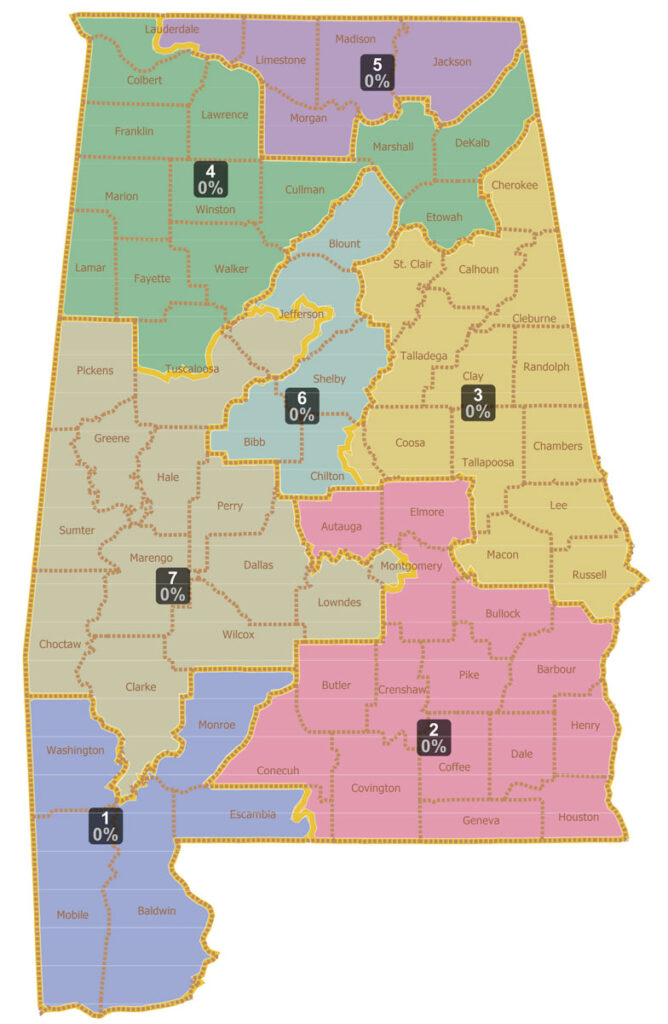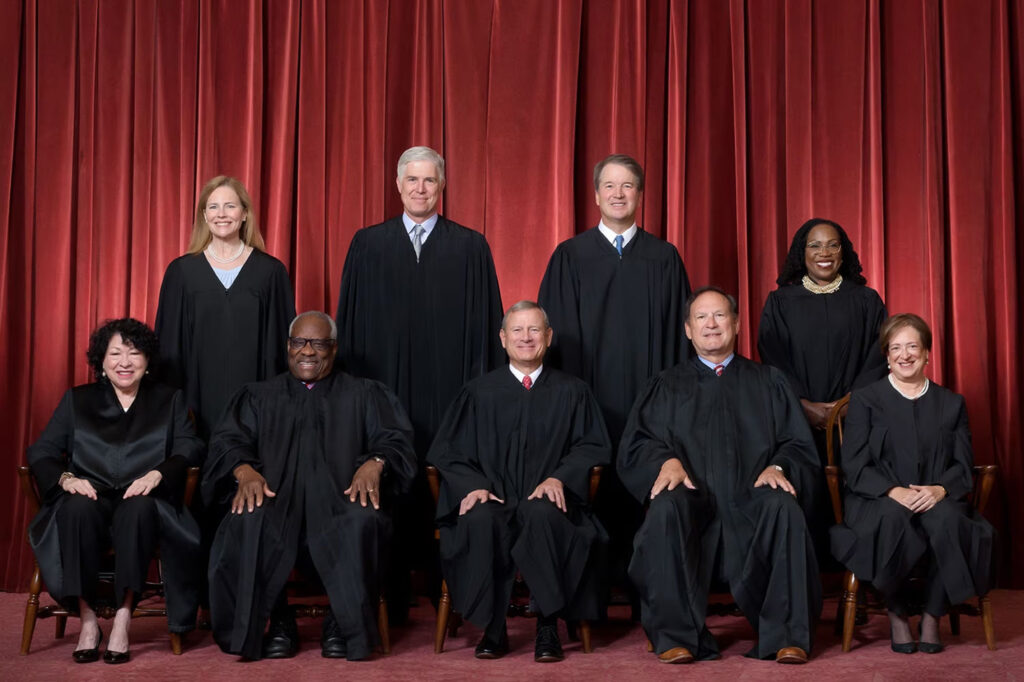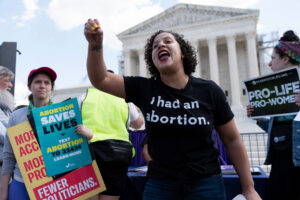Alabama must draw a second majority-Black congressional district after the U.S. Supreme Court ruled this morning that the State violated the voting rights of its Black residents under Section 2 of the federal Voting Rights Act.
During 2020 redistricting, the state’s Republican majority drew a map that packed many of the state’s Black residents into a single majority-Black congressional district, leaving the other six congressional districts majority white. More than a quarter of Alabama’s residents are Black.
“A district is not equally open … when minority voters face—unlike their majority peers—bloc voting along racial lines, arising against the backdrop of substantial racial discrimination within the State, that renders a minority vote unequal to a vote by a nonminority voter,” Chief Justice John Roberts, a conservative George W. Bush-appointee, wrote for the court’s 5-4 majority in Allen v. Milligan.
The plaintiffs praisd the decision in a statement with the Legal Defense Fund this morning, saying the “fight was won through generations of Black leaders who refused to be silent.” The plaintiffs include Evan Milligan, Khadidah Stone, Letetia Jackson, Shalela Dowdy, Greater Birmingham Ministries and the Alabama State Conference of the NAACP

“In 2021, Alabama lawmakers targeted Black voters by packing and cracking us so we could not have a meaningful impact on the electoral process. They attempted to redefine Section 2 of the Voting Rights Act and shirk their responsibility to ensure communities of color are given an equal opportunity to elect their preferred candidates. Today, the Supreme Court reminded them of that responsibility by affirming the district court’s order that a new map be drawn that complies with federal law—one that recognizes the diversity in our state rather than erasing it,” the Alabama plaintiffs said.
The decision could have an impact on other states with contested map, such as Louisiana, where the state legislature’s Republican majority drew a congressional map with one Black-majority district and five white-majority districts. Louisiana Gov. John Bel Edwards, a Democrat who vetoed the map before the GOP majority overrode his veto, praised the outcome for Alabama in a statement today. A legal challenge to that map is pending.
“As I said when I vetoed it, Louisiana’s current congressional map violates the Voting Rights Act,” Edwards said in a statement this morning. “Louisiana’s voting population is one-third Black. We know that in compliance with the principles of the Voting Rights Act, Louisiana can and should have a congressional map where two of our six districts are majority Black. Today’s decision reaffirms that.”
Roberts’ ruling comes a decade after his decision in the Alabama case Shelby County v. Holder. That ruling struck down Section 5 of the Voting Rights Act, which had required states with a history of racially discriminatory voting practices like Alabama and Mississippi to obtain preclearance with the U.S. Department of Justice before making changes to voting laws and procedures.
“Is it the government’s submission that the citizens of the South are more racist than the citizens of the North?” the skeptical chief justice asked during the 2013 Shelby hearings.
After the Supreme Court struck down Section 5 of the Voting Rights Act in 2013, southern and Republican-led states enacted a flurry of changes to their voting laws, including Mississippi, which adopted voter ID requirements. Though today’s decision does not restore the Voting Rights Act’s preclearance requirements, it does mean the court is not further weakening the 1965 law as many voting rights advocates had feared based on Roberts’ 2013 ruling.
“Since the U.S. Supreme Court gutted preclearance in Shelby County v. Holder, this redistricting cycle was the first without federal oversight, allowing hostile state governments to pass maps that dilute the voices of Black voters and other voters of color,” the LDF said in its statement today. “This decision is a clear message to lawmakers that their responsibility has not changed: They must ensure that voters of color are not denied an opportunity to participate in the electoral process.”
Along with the chief justice, the majority in today’s ruling included conservative Donald Trump appointee Justice Brett Kavanaugh and the court’s three liberal justices: Joe Biden appointee Justice Ketanji Brown Jackson and the Barack Obama-appointed justices Elena Kagan and Sonia Sotomayor.
The four dissenting conservative justices included Trump-appointed justices Neil Gorsuch and Amy Coney Barrett; George W. Bush appointee Samuel Alito; and George H.W. Bush appointee Clarence Thomas.
In his 50-page dissent, Thomas, who is Black, claimed that the law does not require states to draw congressional districts in which Black voters have proportional representation, “and if it did, the Constitution would not permit it.”
U.S. Attorney General Merrick B. Garland celebrated the ruling in a statement this morning.
“Today’s decision rejects efforts to further erode fundamental voting rights protections, and preserves the principle that in the United States, all eligible voters must be able to exercise their constitutional right to vote free from discrimination based on their race,” he said. “The right to vote is the cornerstone of our democracy, the right from which all other rights ultimately flow.”
Garland also called on Congress “to act to provide the Department with important authorities it needs to protect the voting rights of every American.”










